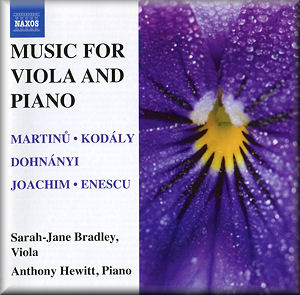 |
 |
|


alternatively
CD:
MDT
AmazonUK
AmazonUS
Sound Samples & Downloads
|
Music for Viola and Piano
Bohuslav MARTINŮ (1890-1959)
Sonata for Viola and Piano, H 355 [14:27]
Zoltán KODÁLY (1882-1967)
Adagio [8:46]
Erno DOHNÁNYI (1877-1960)
Sonata in C sharp minor, Op 21 (arr. Sarah-Jane Bradley) [18:24]
Joseph JOACHIM (1831-1907)
Hebrew Melodies, “Impressions of Byron’s Poems” Op 9 [17:09]
George ENESCU (1881-1955)
Concertstück [8:46]
 Sarah-Jane Bradley (viola); Anthony Hewitt (piano)
Sarah-Jane Bradley (viola); Anthony Hewitt (piano)
rec. 24-25 July, 2008, Potton Hall, Westleton, Suffolk, UK
 NAXOS 8.572533 [67:32]
NAXOS 8.572533 [67:32]
|
|
|
The line-up, on paper, looks mouthwatering: five eastern European
composers with strong connections to the folk music of their
homelands, and distinctive personal styles of their own. Bohuslav
Martinů of the Czech Republic; Zoltán Kodály and Erno Dohnányi
of Hungary; Georges Enescu of Romania; the German Joseph Joachim,
an avid folklorist who arranged Brahms’ Hungarian Dances for
violin and piano and composed a titanic violin concerto “In
the Hungarian Style”. For some reason, though, the works here
occasionally disappoint; the viola has a reputation for dourness
and dryness which these composers sadly do not help to defeat.
The performances, at any rate, are excellent. Violist Sarah-Jane
Bradley enlivens Martinů’s viola sonata with a keen ear
for both the unsteady emotional balance - there are slightly
ugly moments of pizzicato strumming - and the occasional episodes
(as at 2:00 in the final allegro) of simple melodic reassurance.
Accompanist Anthony Hewitt is unusually assertive, as he needs
to be, for there is an impressive cadenza for him to navigate.
Kodály’s Adagio is an early work, exhibiting little of
the composer’s later-celebrated devotion to folk melody. Instead
it sounds a bit like a Brahms adagio, with a bit of a hymnal
atmosphere, and only the slightest betrayal of folk influence
in a tiny but flamboyant viola solo near the end.
Erno von Dohnányi’s sonata - originally for violin and arranged
by Bradley; it had been played on viola a century ago by Lionel
Tertis - begins with an “allegro appassionato” that really comes
across as the most tender, beautiful track on the disc, especially
with playing as poetic as this. The next two movements are more
vigorous, including a finale which begins dancing but winds
down to a heart-melting finish. The three Hebrew Melodies
by Joseph Joachim, by contrast, are seventeen minutes of mostly
slow music, and though they don’t really sound too Jewish to
my ears (not in the style of, say, Bloch), they are touched
with Joachim’s lyrical breadth and sense of fantasy. The disc
concludes with Enescu’s Concertstück, a competition piece
which fuses winning tunes and high virtuosity for the violist.
The sound is close and maybe somewhat dry, as if in a small
room; Bradley’s viola is clearly in the left channel and Hewitt’s
piano is on the right. Bradley has written her own informative
booklet note. If I don’t seem enthusiastic, it’s not for any
lack of quality in the production or performances; it’s just
that, though I liked the Dohnányi and the Kodály, some of the
other elements of this program are harder to enjoy than they
are to respect.
Brian Reinhart
|
|












